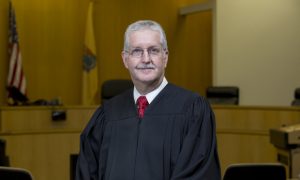Borgata Assault Case Reinstated
Despite the regulated nature of the casino business, expert testimony wasn't needed to establish a duty of care, the Appellate Division said.
January 16, 2020 at 09:50 AM
6 minute read
 Borgata Hotel Casino & Spa in Atlantic City, New Jersey/courtesy photo
Borgata Hotel Casino & Spa in Atlantic City, New Jersey/courtesy photo
The personal injury case of a man who claims he was physically assaulted by a patron inside the Borgata Hotel Casino & Spa in Atlantic City, while casino security stood by and failed to prevent or even subdue the assault, can proceed to trial, the Appellate Division has ruled.
Judge William Nugent, who delivered the 19-page opinion on behalf of the court, said expert testimony wasn't necessary to validate the claim that plaintiff Jaymie M. Cornine's safety was reasonably threatened when defendant Jonathan S. Puccia became verbally abusive, then physically menacing, at a craps table in the early morning hours of Jan. 1, 2014.
The case, filed in May 2015, was on appeal from the summary judgment dismissal of Cornine's complaint against the Borgata. A trial court in Sussex County dismissed Cornine's suit because he failed to produce expert testimony to prove Borgata's negligence in handling the incident.
"The trial court reasoned that since plaintiff did not allege Borgata's security, in general, was inadequate, and because the summary judgment record demonstrates a jury question as to whether Borgata employees negligently failed to take minimal action to prevent the assault—a matter not beyond the ken of a lay person—we reverse and remand for trial," Nugent said in the opinion.
"Borgata argues plaintiff needed an expert to establish a breach of its duty and that Puccia's assault of plaintiff was foreseeable," but there "is no general rule or policy requiring expert testimony as to the standard of care," Nugent said, citing Scully v. Fitzgerald. "Nor is expert testimony always required to assess whether a particular defendant acted negligently."
Nugent said expert testimony is not necessary when the jury can understand the concepts in a case using common sense and experience.
Richard Arthur Dunne, a solo in Mountainside, represented Cornine. "[The decision] allows us to actually proceed to trial so my client can go before a jury of his peers who can adjudicate the issue of whether the casino's security force was negligent in its failure to implement the security procedures it had in place without the need for an expert," Dunne said in a phone call. "My client and I are overjoyed with the outcome but dismayed it took a year after the oral argument to receive it when the sole issue on appeal involved simple negligence."
Justin Britton of Cooper Levinson in Atlantic City represented the Borgata. Britton was not available to comment.
Cornine alleges that Borgata breached its duty to use reasonable care to make its premises safe for business invitees such as himself and negligently failed to take any action to prevent or stop the assault by Puccia. He claims Borgata employees watched and did nothing as Puccia's violent behavior intensified, resulting in an injury warranting punitive damages.
On New Year's Day 2014, Cornine alleges that Puccia and Puccia's girlfriend were playing craps at the Borgata when Puccia became visibly irate at Cornine for conversing with his girlfriend and told Cornine to "shut the f*** up," according to the decision.
Puccia's girlfried tried to calm Puccia down, to which he responded by striking her face with his back hand, Cornine told investigators. Puccia then allegedly threw a cup filled with ice and a beverage toward Cornine, and attempted to leap across the table and strike him with a closed fist. When Puccia missed, Cornine said he walked around the craps table and wrestled Cornine to the floor.
Cornine said as he was pinned to the casino floor with Puccia on top of him and began experiencing extreme pain in his left knee. He claims it took Borgata security a long time to come to his aid to pull Puccia off him, and that no other Borgata personnel attempted to help him. He alleges that the moment Puccia struck his girlfriend, security staff should have removed him from the property to prevent the assault from ever happening, but they didn't.
The incident was captured on surveillance videos by the Borgata, the court noted: at least 16 seconds elapsed between Puccia throwing his drink at Cornine and trying to land a punch to his face, and 10 more seconds elapsed before Puccia charged toward him and injured his knee, Corrine claims.
Borgata's incident report noted that Puccia was detained and eventually evicted permanently from the casino, according to the court.
The trial court entered a default judgment of $160,000 plus prejudgment interest against Puccia, but granted the Borgata's motion for summary judgment following discovery, leading to the appeal.
The Borgata hired an expert to assess the incident, who found the response reasonable and in compliance with the New Jersey gaming law, according to the decision. The expert said the threat of bodily harm was communicated by Puccia to Cornine leading up to the attack and, therefore, "the event could not have been prevented by the Borgata despite its employment of reasonable and customary security industry measures."
 New Jersey Appellate Division Judge William Nugent/courtesy photo
New Jersey Appellate Division Judge William Nugent/courtesy photo"We disagree that absent Puccia verbalizing his intent to harm plaintiff, a jury could not conclude it was foreseeable that he would do so," Nugent wrote in the Jan. 14 opinion.
The court also rejected Borgata's contention that an expert was necessary because of the regulated nature of the casino business.
"Indisputably, as Borgata asserts, the casino industry is highly regulated," Nugent wrote. "However, Borgata has not cited any industry standard that addresses the specific issues of duty and proximate cause presented here. Borgata has failed to demonstrate that these issues 'are so esoteric or technical to be beyond jurors' common notions of reasonableness.'"
Nugent said to present a prima facie claim of negligence against the Borgata, Cornine was required to prove a duty of care, a breach of that duty, proximate cause, and actual damages.
"Here, Borgata does not dispute that plaintiff was a business invitee," Nugent wrote. "As such, Borgata owed plaintiff a duty 'to provide a reasonably safe place to do that which is within the scope of the invitation.'" And no expert was necessary to establish the duty of care, the court ruled.
"Here, expert testimony is unnecessary and should not be permitted," Nugent wrote. "A jury is quite capable of understanding the concepts of duty, breach, and proximate cause."
This content has been archived. It is available through our partners, LexisNexis® and Bloomberg Law.
To view this content, please continue to their sites.
Not a Lexis Subscriber?
Subscribe Now
Not a Bloomberg Law Subscriber?
Subscribe Now
NOT FOR REPRINT
© 2025 ALM Global, LLC, All Rights Reserved. Request academic re-use from www.copyright.com. All other uses, submit a request to [email protected]. For more information visit Asset & Logo Licensing.
You Might Like
View All
'The Tobacco Industry of This Decade': Slew of Class Actions Accuse DraftKings of Creating Addicts
5 minute read


Sports Attorney Rejoins Jets for Second Tour of Duty as GC
Trending Stories
Who Got The Work
J. Brugh Lower of Gibbons has entered an appearance for industrial equipment supplier Devco Corporation in a pending trademark infringement lawsuit. The suit, accusing the defendant of selling knock-off Graco products, was filed Dec. 18 in New Jersey District Court by Rivkin Radler on behalf of Graco Inc. and Graco Minnesota. The case, assigned to U.S. District Judge Zahid N. Quraishi, is 3:24-cv-11294, Graco Inc. et al v. Devco Corporation.
Who Got The Work
Rebecca Maller-Stein and Kent A. Yalowitz of Arnold & Porter Kaye Scholer have entered their appearances for Hanaco Venture Capital and its executives, Lior Prosor and David Frankel, in a pending securities lawsuit. The action, filed on Dec. 24 in New York Southern District Court by Zell, Aron & Co. on behalf of Goldeneye Advisors, accuses the defendants of negligently and fraudulently managing the plaintiff's $1 million investment. The case, assigned to U.S. District Judge Vernon S. Broderick, is 1:24-cv-09918, Goldeneye Advisors, LLC v. Hanaco Venture Capital, Ltd. et al.
Who Got The Work
Attorneys from A&O Shearman has stepped in as defense counsel for Toronto-Dominion Bank and other defendants in a pending securities class action. The suit, filed Dec. 11 in New York Southern District Court by Bleichmar Fonti & Auld, accuses the defendants of concealing the bank's 'pervasive' deficiencies in regards to its compliance with the Bank Secrecy Act and the quality of its anti-money laundering controls. The case, assigned to U.S. District Judge Arun Subramanian, is 1:24-cv-09445, Gonzalez v. The Toronto-Dominion Bank et al.
Who Got The Work
Crown Castle International, a Pennsylvania company providing shared communications infrastructure, has turned to Luke D. Wolf of Gordon Rees Scully Mansukhani to fend off a pending breach-of-contract lawsuit. The court action, filed Nov. 25 in Michigan Eastern District Court by Hooper Hathaway PC on behalf of The Town Residences LLC, accuses Crown Castle of failing to transfer approximately $30,000 in utility payments from T-Mobile in breach of a roof-top lease and assignment agreement. The case, assigned to U.S. District Judge Susan K. Declercq, is 2:24-cv-13131, The Town Residences LLC v. T-Mobile US, Inc. et al.
Who Got The Work
Wilfred P. Coronato and Daniel M. Schwartz of McCarter & English have stepped in as defense counsel to Electrolux Home Products Inc. in a pending product liability lawsuit. The court action, filed Nov. 26 in New York Eastern District Court by Poulos Lopiccolo PC and Nagel Rice LLP on behalf of David Stern, alleges that the defendant's refrigerators’ drawers and shelving repeatedly break and fall apart within months after purchase. The case, assigned to U.S. District Judge Joan M. Azrack, is 2:24-cv-08204, Stern v. Electrolux Home Products, Inc.
Featured Firms
Law Offices of Gary Martin Hays & Associates, P.C.
(470) 294-1674
Law Offices of Mark E. Salomone
(857) 444-6468
Smith & Hassler
(713) 739-1250






